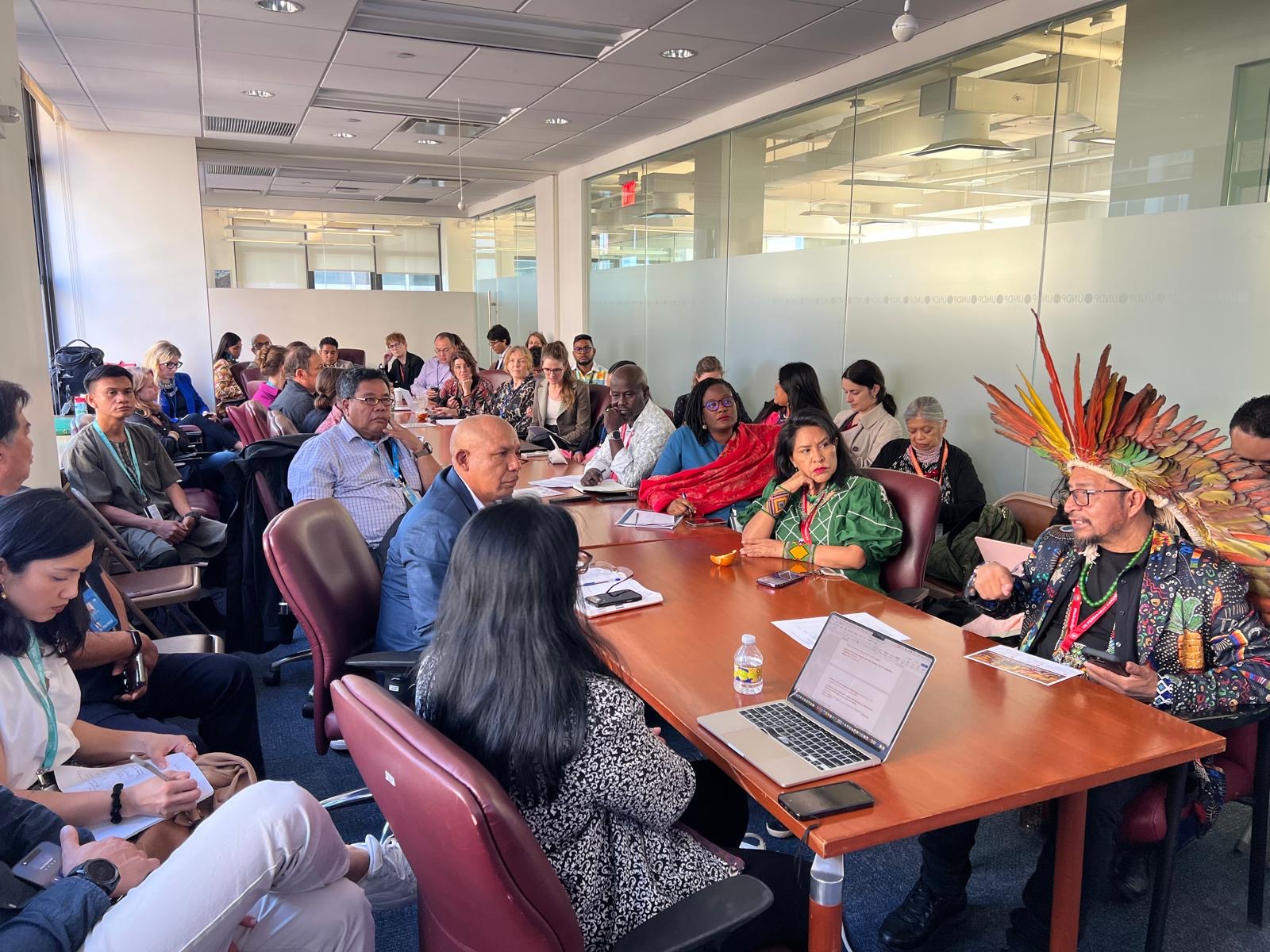
In recent years, new initiatives and revised standards aimed at addressing significant shortcomings in environmental integrity of carbon credits have emerged. Social integrity, including respect for Indigenous Peoples’ rights, remains less thoroughly addressed.
Carbon credits generated from forests on Indigenous territories present both opportunities and challenges – it is therefore crucial to ensure that effective systems are in place to ensure carbon projects respect internationally recognized human rights. Diverse actors have a role to play, including carbon crediting programs, governments, project developers, validation and verification bodies, and technical service providers.
A recent event, organized by the United Nations Development Programme (UNDP), Climate Focus, ELATIA (Indigenous Peoples' Global Partnership on Climate Change, Forests and Sustainable Development), Forest Peoples Programme and Rainforest Foundation-US, with support from the UK government and the UN-REDD Programme, shared new tools designed to support Indigenous Peoples. The tools are designed to support Indigenous Peoples to strategically participate in carbon projects, ensuring their voices are heard and their rights to lands, territories and resources are respected. Participants at the well-attended event were keen to learn from concrete examples of effective consultation and consent processes, and equitable benefit-sharing mechanisms in carbon projects. The event also heard from Indigenous Peoples, who shared their diverse perspectives on the potential benefits and risks of carbon markets. Among concerns raised was the effectiveness of grievance redress mechanisms at multiple levels, including within projects, standard certification bodies, and those adopted by the UNFCCC under Article 6.4.
TOOLS DESIGNED FOR INDIGENOUS PEOPLES
UNDP recently launched the High Integrity Carbon Markets Initiative, focusing on supply-side integrity, to level the playing field – for host countries at all levels, but also landowners, farmers, households and rights-holders, including Indigenous Peoples, Afro-descendants, local communities and women. The initiative seeks to ensure all parties are equally informed and have the ability to strategically engage; fairer terms, conditions and prices are negotiated with buyers; and most importantly, that benefit sharing, sustainable development impacts and social and environmental safeguards are at the centre of carbon program design and implementation. (For more information see FAQs.)
Climate Focus has developed the Voluntary Carbon Market (VCM) Primer, an online publication that breaks down key VCM concepts for a general audience. This year, Climate Focus and UNDP will also launch a decision tool aimed at guiding Indigenous Peoples and Local Communities in making informed decisions about engaging with the VCM. The tool walks users through a series of interrelated questions to help them identify relevant considerations for their groups. The goal is to provide information enabling Indigenous Peoples and local community members, leaders, and organizations to make well-informed decisions regarding VCM engagement.
The Forest Peoples Programme (FPP) and the Global Justice Clinic of the NYU School of Law have developed Carbon Markets, Forests, and Rights Explainers. These resources aim to support Indigenous Peoples and local communities in making informed decisions about carbon markets.
Rainforest Foundation US is developing a six-part series of videos, Carbon Markets and Our Rights: A Guide for Indigenous Peoples and Local Communities. Three videos have been released so far, and the remaining videos will be released over the next few months.
TOOLS FOR INCLUSIVE CLIMATE ACTION
As these tools are implemented, refined and expanded upon, they will contribute to more equitable and inclusive climate action. The intended outcomes of the guidance and tools include:
- Enhanced understanding. Indigenous Peoples need comprehensive knowledge about carbon markets, including their mechanisms, potential benefits, and risks.
- Empowered participation. Indigenous Peoples must be equipped with the skills and tools necessary to actively engage in the development and implementation of carbon projects.
- Safeguarded rights. Indigenous Peoples’ rights, land tenure, and traditional knowledge must be respected and protected within carbon market standards and initiatives. This includes their right to Free, Prior and Informed Consent (FPIC).
- Increased benefits. Indigenous Peoples should receive equitable benefits from carbon projects they choose to participate in, fostering socio-economic development and resilience.
- Strengthened governance. Inclusive decision-making processes should empower Indigenous Peoples to contribute to environmental governance and policy development.
SAFEGUARDING HUMAN RIGHTS
In addition to the importance of ground-up technical assistance for Indigenous Peoples, the event also highlighted challenges and recommendations to the broader carbon market ecosystem of actors to provide a comprehensive framework that ensures respect for human rights. These included:
- Carbon Crediting Programs should include key safeguards provisions related to Indigenous Peoples rights where applicable, including for example (list is non-exhaustive):
- Recognize and foster full respect for Indigenous Peoples human rights under Applicable Law (national law and international obligations, whichever higher);
- Ensure projects are designed in partnership with full, effective participation by Indigenous Peoples, and securing FPIC where the rights, lands, resources, territories and traditional livelihoods of Indigenous Peoples are affected;
- Avoid adverse impacts, mitigate residual impacts, ensure just, equitable benefits and opportunities in culturally appropriate manner;
- Recognize Indigenous Peoples have collective rights to own, use, develop, control lands, territories, resources, they have traditionally owned, occupied, otherwise used or acquired;
- When necessary, an effective project-level grievance redress mechanism is made available. These mechanisms address concerns promptly through dialogue and engagement, using an understandable and transparent process that is culturally appropriate, rights-compatible, and readily accessible to all stakeholders at no cost and without retribution (effective grievance mechanisms should also be made available at the carbon crediting program level); and
- Refrain from providing support for activities that may contribute to violations of a host States’ human rights obligations and the core international human rights treaties.
- Project developers should apply robust procedures for screening, assessing, managing, monitoring and reporting potential adverse impacts related to Indigenous Peoples rights.
- Host Countries should establish policy, legal and regulatory frameworks for Article 6 transactions, and guidance in the context of the VCM, to ensure project developers active in their countries and carbon projects taking place in their countries are in line with the above provisions.
- Carbon Credit Rating Agencies should incorporate a means to assess the safeguards provisions listed above into their ratings methodologies and scores, to reflect a more comprehensive, realistic assessment of the quality of a carbon project (credits to be purchased).
- Validation and Verification Bodies should ensure they have the necessary assessment methodologies and human resource capacities to undertake social audits associated with respect for Indigenous Peoples rights.
- Buyers should signal a greater interest and value for carbon credits that demonstrate respect for Indigenous Peoples rights and establish robust internal due diligence capacities to confirm this before purchases are made.



